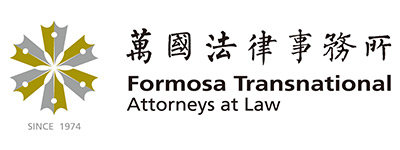The major laws in the intellectual property (IP) field in Taiwan include the Patent Act, the Trademark Act, the Copyright Act and the Trade Secret Act, among others. To obtain protection, applications must be filed and approved to register patents and trademarks, while copyright and trade secret protection require no registration. For patents and trademarks, Taiwan adopts the first-to-file registration system. The right is generally granted to the first applicant for a particular patent, and/or trademark, if all relevant legal requirements are satisfied.

Partner
Formosa Transnational
Taipei
Email: brian.hsieh@taiwanlaw.com
Three types of patents are available in Taiwan, namely, invention patents, new utility model patents and design patents. An invention patent is granted to a technical creation that has novelty, non-obviousness and utility. Invention patents are protected for 20 years from the date on which the patent application was filed. An extension of the patent term is allowed for a pharmaceutical or agrichemical or manufacturing process, taking into account the delay in obtaining the required regulatory approvals.
A new utility model is a creation made in respect of the form, construction or fitting of an object, and is protected for 10 years from the filing date. A design patent is a creation made in respect of the shape, pattern, colour – or combination of these – of an article as a whole or in part by visual appeal, and is protected for 15 years from the filing date.
The four types of trademarks available in Taiwan are trademarks, certification marks, collective membership marks, and collective trademarks. A trademark is a type of identification used on or with goods and/or services to indicate the source or origin of the goods or services offered, and can be composed of a word, sign, symbol, colour, three-dimensional shape, motion, hologram, sound, or a combination of these.

Partner
Formosa Transnational
Taipei
Email: monica.wang@taiwanlaw.com
Geographical indications may be registered as certification marks, allowing goods or services to be associated with their origin’s reputation for quality or other characteristics. Collective membership marks and collective trademarks are for associations, societies or groups to identify the membership and members who provide the goods or services provided.
Copyright protection is available for spoken and literary works, musical works, dramatic and choreographic works, artistic works, photographic works, pictorial and graphical works, audiovisual works, sound recordings, architectural works, and computer programs. Economic rights to copyright are protected from the time the copyrighted work is created and last until 50 years after the death of the creator. A business entity’s economic copyrights last for 50 years from the time of public release, or 50 years from the time of creation if the work has never been publicly released.
Trade secret protection is available for any method, technique, process, formula, program, design or other information that may be used in the course of production, sales or operations if it is not known to persons generally knowledgeable of the same type of information, and if the secret has actual or potential economic value due to its secretive nature, and its owner has taken reasonable measures to maintain secrecy.
RECIPROCAL ENFORCEMENT
Taiwan’s IP regime is open to foreign nationals on a reciprocal basis. For patents and trademarks – the two kinds of IP rights that require approval from, and registration by, the Taiwan Intellectual Property Office (TIPO) – foreign nationals are eligible to apply for patent and trademark protection as long as their home countries also make patent and trademark protection available to Taiwanese citizens.

Partner
Formosa Transnational
Taipei
Email: jane.wang@taiwanlaw.com
Under Taiwan’s Patent Act and Trademark Act, as long as a foreign company can properly establish that it duly holds a Taiwanese patent or trademark registration, it does not need to have corporate recognition from the Taiwan government – which recognition exists when a foreign company has a presence in Taiwan registered at Taiwan’s corporate registry – before it may seek remedies available to all Taiwanese citizens.
Furthermore, as trademark violations will result in criminal liabilities under Taiwan’s Trademark Act – unlike Taiwan’s Patent Act, which stipulates only civil liabilities for patent infringement – the act allows a foreign company holding a Taiwanese trademark to initiate criminal actions against those using its trademark without proper authorisation.
For copyright and trade secrets, two kinds of IP rights that do not require governmental approval or registration before rights owners can enjoy legal protections, foreign nationals may obtain protection for their works or secrets in the same way that a Taiwanese citizen does.
In addition, currently a foreign company may initiate civil or criminal litigation against those who infringe on its copyright or trade secrets, seeking the same remedies that are available to a Taiwanese copyright or trade secrets owner.
Based on the authors’ observations of the practices of the Taiwan IP Court, the judicial body that exclusively hears IP matters, it does not treat foreign companies as parties to civil proceedings in any way differently from the way it treats Taiwanese parties.
The only exception is where a foreign national initiates civil litigation, in which case the foreign plaintiff may be required, on a motion duly filed by the defendant in the same proceeding, by the court to deposit a bond of an amount no less than the court fees for the second and third instances, where the foreign plaintiff has no domestic residence or business office in Taiwan.
When the defendant makes such a motion, requesting the court to require the foreign plaintiff to deposit a bond, the defendant can refuse to proceed with the litigation before the court rules on the motion, or the foreign plaintiff complies with the court’s ruling in this regard.
Under Taiwan’s Code of Civil Procedure, a foreign plaintiff may be exempt from the requirement to deposit the bond if it can establish that it owns assets in Taiwan, of which the value is higher than the amount of the court fee bond. The court has discretion in ruling whether or not the value of the foreign plaintiff’s assets in Taiwan exceeds the amount of the otherwise required court fee bond.
TRADE SECRET LAW
When Taiwan’s Trade Secret Act was enacted in 1996, it only provided secret owners with civil remedies (monetary compensation and or injunctive relief) for any misappropriation of their secrets. At that time, secret owners had to rely on Taiwan’s Criminal Code if they wanted to pursue criminal liabilities for those who stole their secrets.
In 2013, the Trade Secret Act was amended to impose criminal liabilities on those who misappropriated trade secrets. In addition, increased penalties would be imposed on those who misappropriate trade secrets with the intention of using said secrets in a foreign country.
Importantly, under the 2013 amendments, employers may face criminal liabilities if their employees misappropriate trade secrets during the course of the employees’ performance of their duties to the employers. The employers may be exempt from the same criminal liabilities only if the employers can establish that the employers have taken all possible measures to prevent their employees from misappropriating others’ trade secrets.
In 2022, Taiwan further revised its trade secret laws, under which a convicted offender would face a maximum of 12 years in prison and be fined NTD5 million (USD163,000) to NTD100 million.
The amendment was made for preventing “critical core technologies” from being misappropriated or leaked to competitors, as well as of enhancing the protection of Taiwan’s high-tech industries and economic interests. The term critical core technologies refer to technologies that may significantly enhance the competitiveness of important industries in Taiwan or shall be protected due to security concerns and shall be recognised by the relevant administrative agency.
13/F, 136 Jen Ai Road, Sec. 3, Taipei
Tel: +886 2 2755 7366
Email: ftlaw@taiwanlaw.com































